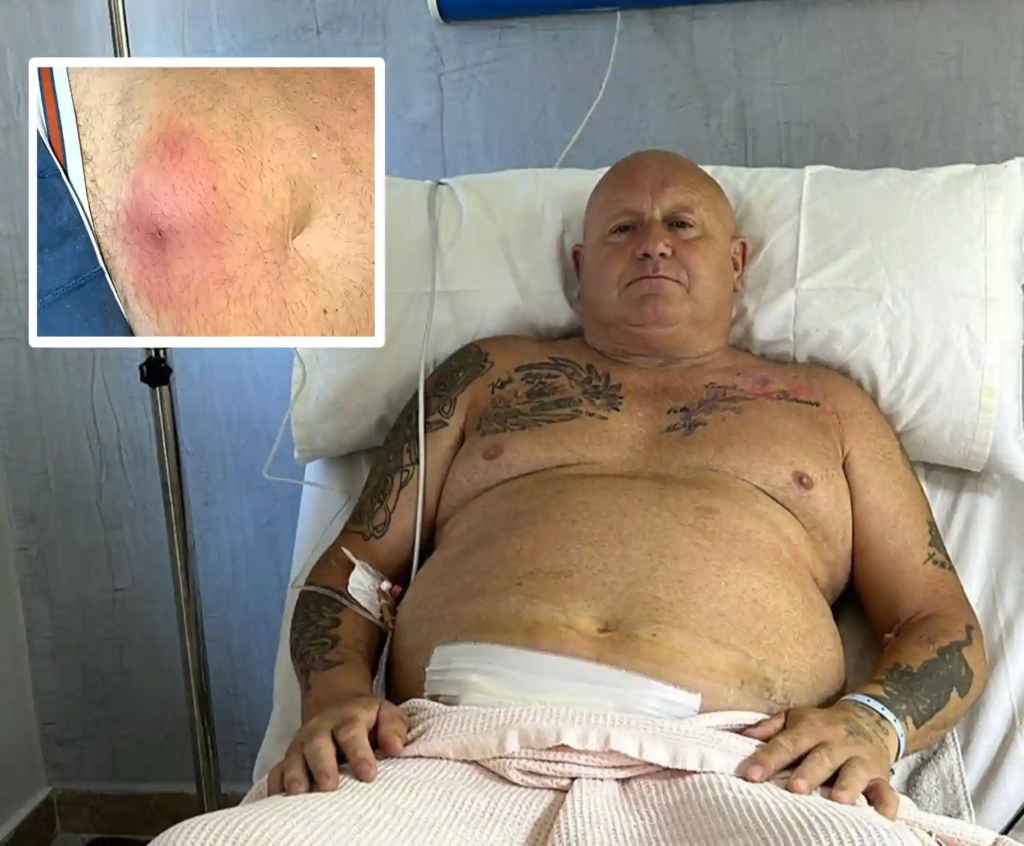Flesh-eating disease develops in 59-year-old British man, Nigel Hunt, from the Isles of Scilly, faced a harrowing ordeal after a spider bite turned into a life-threatening flesh-eating disease known as necrotising fasciitis.
The incident occurred on August 30 when Hunt was preparing for a vacation in Egypt. Initially, the spider bite on his stomach appeared minor, and Hunt felt no immediate pain. However, what started as an innocuous bite quickly spiraled into a severe medical emergency.
The Trip Takes a Terrifying Turn
Hunt began his journey to Sharm El-Sheikh without any signs of illness, but his condition took a rapid turn for the worse as he traveled. By the time he arrived in Egypt, Hunt was seriously ill and had to seek medical attention. Initially, doctors diagnosed the wound as an abscess.
However, further tests revealed that Flesh-eating disease had developed necrotising fasciitis, a rare and dangerous infection often referred to as a “flesh-eating” disease.
Read : United Kingdom: Where Captivating History Whispers and Vibrant Culture Thrives
The infection was so severe that it required emergency surgery to prevent it from spreading further. Hunt later credited the swift intervention with saving his life. “If I hadn’t gone back within that critical window, I wouldn’t be alive today,” he said, emphasizing the seriousness of the condition.
Spider Bite to Flesh-Eating Disease

Hunt’s nightmare began with what appeared to be a common spider bite. While the specific spider responsible for the bite was initially unknown, tests conducted in the hospital in Egypt identified it as either a false widow or a brown recluse spider. Both types of spiders are known for their venomous bites, which can occasionally lead to severe reactions in humans.
False widow spiders, in particular, have become more common in the UK in recent years, and their bites, while usually not fatal, can sometimes result in complications like infections. The brown recluse spider, on the other hand, is notorious for causing severe tissue damage due to its venom, leading to conditions like Flesh-eating disease in rare cases.
Necrotising Fasciitis: A Rare and Deadly Condition
Necrotising fasciitis is a rare bacterial infection that spreads rapidly, destroying the body’s soft tissue. Commonly referred to as a flesh-eating disease, it requires immediate medical attention and, in severe cases, can result in amputation or death. Early symptoms often include pain, redness, and swelling around the infected area, but the infection can progress rapidly, making early diagnosis critical for survival.
In Hunt’s case, the infection spread quickly after the spider bite, leading to a medical emergency. Had he not returned to the hospital in time, the infection could have proved fatal. The emergency surgery he underwent in Egypt was crucial in stopping the disease from spreading further and saved his life.
Recalling his experience, Hunt described how he started feeling unwell shortly after arriving at the airport. Despite seeking help at a local pharmacy in Sharm El-Sheikh, his condition worsened, forcing him to visit a second hospital in Hadaba. It was here that the true nature of his infection was revealed. The diagnosis of Flesh-eating disease came as a shock, and Hunt was immediately rushed into surgery.
Following the successful surgery, Hunt has been recovering, though he still requires frequent wound care. The severity of his infection means that the healing process will be long, but he is grateful to have survived the ordeal.
A Warning to Others
After surviving his near-fatal encounter with the flesh-eating disease, Hunt has been urging his fellow residents on the Isles of Scilly and the wider UK to be cautious about spider bites. “It was just a simple bite, but it turned into something that nearly took my life,” Hunt said. His story serves as a sobering reminder of the potential dangers posed by spider bites, even those that may initially seem minor.
Read : Why More Than A Fifth Of UK Adults Not Looking For Work
While spider bites are often harmless, Hunt’s experience highlights the importance of seeking medical attention if symptoms worsen or if there are signs of infection. Flesh-eating disease, though rare, can develop rapidly and requires immediate treatment to prevent serious complications or death.
Increasing Spider Encounters in the UK
In recent years, reports of false widow spiders in the UK have increased, raising concerns about potential bites and their effects on humans. These spiders, which are closely related to the dangerous black widow, are venomous but rarely life-threatening. However, their bites can lead to severe reactions in some individuals, as was the case with Hunt.
While false widow spiders have been known to cause discomfort and localized pain, cases of bites leading to conditions as severe as Flesh-eating disease are extremely rare. Nonetheless, the increasing presence of these spiders in the UK has prompted some experts to call for more public awareness about the potential risks of spider bites.
The brown recluse spider, while not native to the UK, is another venomous species that can cause serious health issues in humans. Its bite can lead to significant tissue damage, and in rare cases, infections like necrotising fasciitis can develop. Though brown recluse spiders are not commonly found in the UK, global travel and trade have occasionally led to their appearance in the region.
The story of Nigel Hunt’s terrifying encounter with a flesh-eating disease following a spider bite is a stark reminder of the potential dangers lurking in seemingly minor injuries. While such cases are rare, they underscore the importance of seeking prompt medical attention for any spider bite, especially if symptoms worsen. Hunt’s survival is a testament to the critical role of timely intervention, and his warning serves as a valuable lesson for others to take spider bites seriously.
As Hunt continues to recover, his experience will likely remain a cautionary tale for those living in areas where venomous spiders are present. His ordeal has drawn attention to the growing presence of false widow spiders in the UK and the need for greater awareness about the potential risks they pose.

